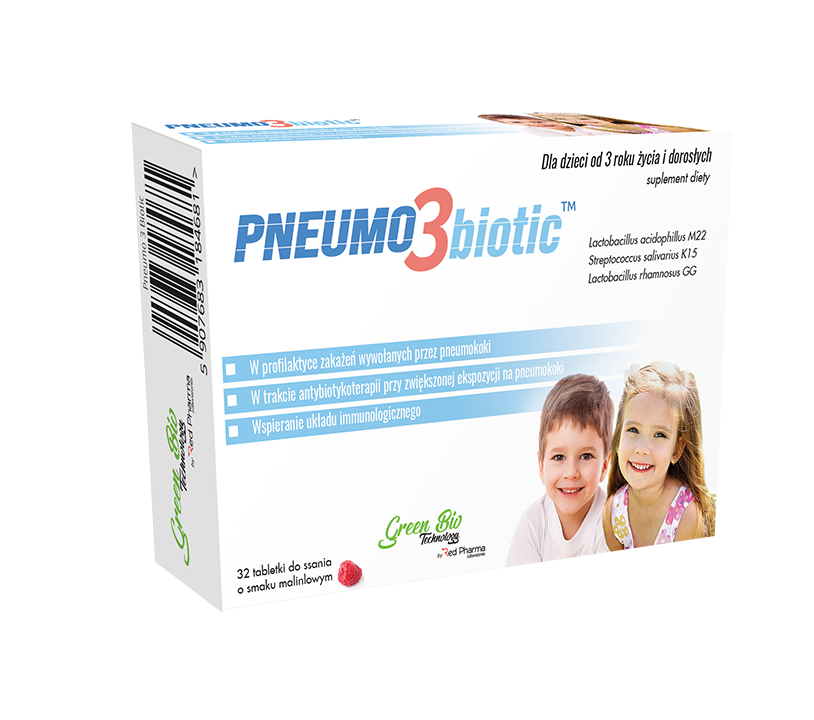
Pneumo3biotic, 32 capsules
in the prevention of pneumococcal infections
Pneumococcus is a common name for the Streptococcus pneumoniae bacterium. Pneumococcal infections can cause diseases of the upper and lower respiratory tract and are responsible for both invasive diseases (IPD), including bacteraemia, pneumonia, meningitis, peritonitis, endocarditis, and pericarditis, which can lead to numerous complications, and non-invasive diseases such as pharyngitis, bronchitis, otitis media and pneumonia.
Vaccines for prophylaxis of infectious conditions included in the mandatory vaccination schedule are supposed to reduce the chance of pneumococcal infection. However, they only immunise the lower respiratory tract and have limited influence on the upper respiratory tract, for example, on the nasopharynx and middle ear. Therefore, there is a need to change the vaccines in a way that they can also prevent upper respiratory infections. These preparations should contain Streptococcus salivarius bacteria, which produce antibiotics that inhibit the growth of pathogenic microorganisms such as Streptococcus pneumoniae and Streptococcus pyogenes. An example of one very innovative solution recently developed involves the usage of a composition of three probiotic bacteria: Lactobacillus acidophilus M22, Streptococcus salivarius K15, and Lactobacillus rhamnosus GG, which colonize the oral cavity and nasopharynx, eliminating pathogenic bacteria. The combination of these three probiotic bacteria strains is supposed to make them work synergistically, which should lead to the elimination of pathogenic bacteria of Streptococcus pneumoniae, increase the body’s immunity, and alleviate symptoms of pneumococcal infection to avoid infections of the middle ear and nasopharynx.
Pneumo 3 biotic contains a composition of three probiotic bacteria, Lactobacillus acidophillus M22, Streptococcus salivarius K15, and Lactobacillus rhamnosus GG, which synergistically slow down the growth of pathogenic bacteria of Streptococcus pneumoniae, which are responsible, for example, for non-invasive pneumococcal diseases such as pharyngitis, bronchitis, and otitis media. Probiotic bacteria of Streptococcus salivarius K15 produce antibiotics that slow down the growth of pathogenic microorganisms such as Streptococcus pneumoniae, which is responsible for upper respiratory tract infections. Lactobacillus acidophillus M22, Lactobacillus rhamnosus GG, and Streptococcus salivarius K15 colonize the oral cavity and nasopharynx, eliminating pathogenic bacteria, which strengthens the immune system and protects the body against pneumococcal diseases.
Recommended intake:
1 tablet a day:
– in the prevention of pneumococcal infections in the period of increased morbidity;
– during antibiotic therapy: 2 hours after administration of the antibiotic;
– after finished antibiotic therapy for 2-3 weeks.
Use:
Take the lozenge before going to bed, after brushing your teeth.The lozenge should be sucked slowly for about 5 minutes until it is completely dissolved. In order to ensure the longest possible contact of the active substance with the pharyngeal mucosa, the lozenges should not be chewed or swallowed. Do not drink immediately after consumption.
Contraindications:
Hypersensitivity to any of the ingredients of the product. Do not use in children under 3 years of age.
Storage:
Store at room temperature, out of the reach of small children.

